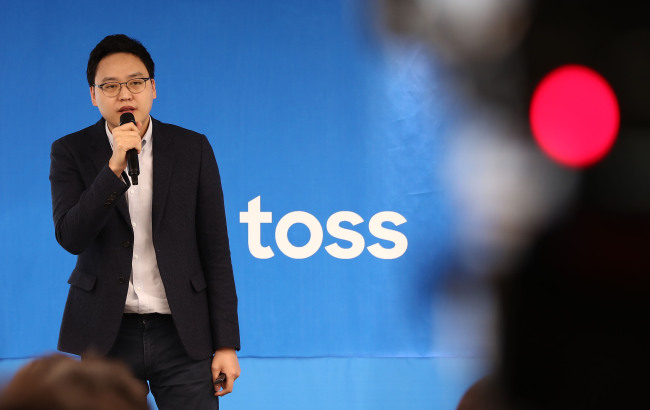Startups
Viva Republica faces hurdles in launching Korea’s 3rd internet-only bank
South Korea’s top fintech firm Viva Republica faces many hurdles as it seeks to bag a license for its consortium to operate the nation’s third internet-only bank.
The startup, known for its flagship domestic money transfer app Toss, hopes to gain preliminary approval from the Financial Services Commission, but faces strong completion from other consortiums -- one of which is led by Kiwoom Securities and KEB Hana Bank.
The FSC has hinted that it is likely to allow two more internet-only banks to operate, besides the existing K bank and Kakao Bank, to spur innovation in the domestic banking industry.
The financial watchdog has permitted more investment from nonfinancial firms and also exempted new online-only lenders from Basel III regulations in their first three years of operation.
 |
Viva Republica founder and CEO Lee Seung-gun speaks at a press conference on March 28 |
Related:
Shinhan Financial withdraws bid for 3rd internet-only bank
Toss lands US$80m investment to become Korea’s first fintech unicorn
Toss app operator to establish own brokerage
Lee Seung-gun, founder and chief executive of Viva Republica, said in a press conference on March 28, a day after it submitted its application, that the firm is moving to follow in the footsteps of challenger banks like Monzo and Revolut in the UK and Nubank in Brazil.
Tentatively dubbed Toss Bank, the new entity with a projected 250 billion won ($219.86 million) capital will be an alternative for some 10 million people with bad credit scores, as it will be able to take advantage of the user base of Toss app, amounting to 11 million customers, and leverage its database to create a more sophisticated system.
Despite Lee’s optimism, , there are still uncertainties regarding the members of its consortium and capacity to raise capital when needed.
Uncertainties in regulatory compliance
Viva Republica looks to establish a separate lender, while retaining its existing financial services including money transfer through its Toss app.
It plans to have a 60.8 percent stake in the consortium, which also includes brokerage Hanwha Investment & Securities, cloud solutions provider Bespin Global, venture capital firms Altos Ventures, Goodwater Capital and Ribbit Capital, as well as Korea Electronic Certification Authority and e-commerce platform Musinsa.
But doubts remain whether it can take up more than 34 percent stake, as nonfinancial companies are banned from holding more than that under the special law designed to promote internet-only banks that took effect in January.
Viva Republica gained a business license as a company dedicated to electronic payments and settlements under the Electronic Financial Transactions Act, under the guidelines of the Korean Standard Industrial Classification.
While there are no guidelines to decide whether a company doing e-financial transaction business is a financial firm under the Banking Act, Lee insisted that Viva Republica is a financial firm as its revenue comes from financial services.
An official at the FSC said it has yet to start reviewing the eligibility. But if the financial authorities regard Viva Republica as a nonfinancial entity after review, the consortium might fizzle out.
Abrupt withdrawal
Questions also linger about to the consortium’s capability to increase capital when needed.
The issue arose after an abrupt announcement a week ahead of the deadline that Shinhan Financial Group, one of Korea’s top financial firms, had quit the consortium.
The major change in consortium came a month after Shinhan considered investing in the Viva Republica-led consortium.
Despite being a startup, Viva Republica itself is capable of raising up to 100 billion won, considering its ability to generate cash revenue, according to Lee. He added the consortium is open to introducing new investors, but with little adjustment to Viva Republica’s stake share.
“It seems to me that shareholders are showing a commitment to what Toss Bank will achieve,” Lee said. “If we had doubts about our ability to increase capital, we would have not have ever started this.”
Moreover, he did not elaborate further on its capacity to raise capital, and instead said that the documents submitted to regulators would prove its capital-raising capability.
The FSC plans to grant preliminary approval in May, after a screening process by the Financial Supervisory Service. Those with preliminary approval can apply for a license once they are ready. The challenger bank will kick off operations within six months after gaining the license.
By Son Ji-hyoung (consnow@heraldcorp.com)








